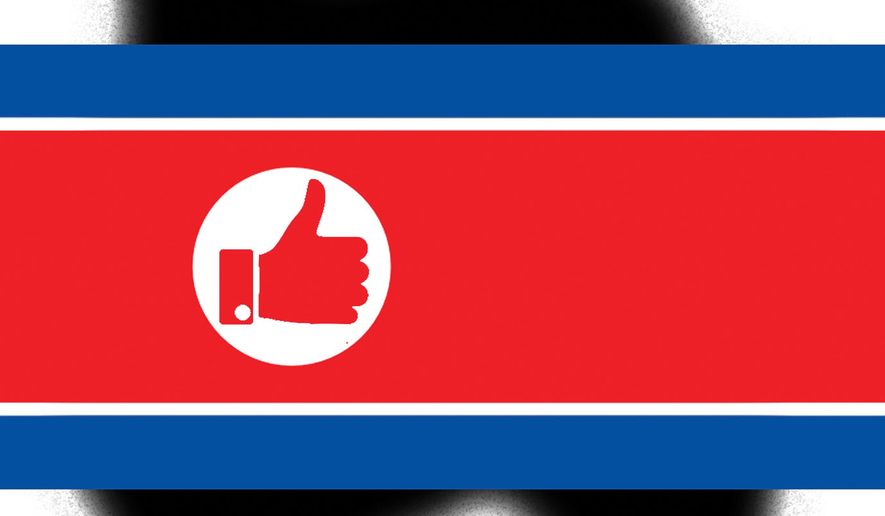OPINION:
North Korean leader Kim Jong-un is ready to do business with President Trump. Over the past few years, Mr. Kim has burnished his credentials as a world leader, and he is well prepared for a fourth substantive meeting with Mr. Trump.
Mr. Kim’s recent meetings with Russian President Vladimir Putin and the new mutual defense treaty with the Russian Federation have developed into an alliance of unexpected consequences. The 15,000 North Korean troops assisting Russian forces in the Kursk region and the massive number of artillery shells, drones and ballistic missiles provided to Russia for its war of aggression in Ukraine were significant developments that surprised many of the pundits who viewed North Korea as a distraction confined to the Korean Peninsula.
Indeed, Mr. Kim’s presence in Beijing for the 80th anniversary of World War II Victory Day celebrations, standing next to Chinese President Xi Jinping and Mr. Putin, was testimony to China’s decision that North Korea cannot be ignored and a close alliance with North Korea is in China’s interest.
Certainly, the parade and gala in Pyongyang on Friday, the 80th anniversary of the founding of the ruling Korean Workers’ Party, was an emboldened Mr. Kim announcing to the world that North Korea has arrived. In the presence of Chinese Premier Li Qiang, former Russian President Dmitry Medvedev, Vietnamese Communist Party Chief To Lam and others, Mr. Kim made it clear when he said North Korea “was a faithful member of socialist forces … and a bulwark for independence … against the West’s global hegemony.”
Doubling down, North Korea at the military parade introduced its new intercontinental ballistic missile, the Hwasong-20, a solid-fuel massive missile capable of carrying multiple nuclear warheads and targeting the whole of the U.S. Other weaponry, including hypersonic and cruise missiles, was also on display, making clear that Mr. Kim was serious when he said North Korea would enhance its nuclear capabilities.
At a recent Workers’ Party plenary session, Mr. Kim said he was prepared to meet with Mr. Trump, on the condition that the U.S. would accept North Korea as a nuclear weapons state. Mr. Kim spoke of fond memories of his previous encounters with Mr. Trump. At the United Nations on Sept. 29, after seven years of being a no-show, North Korean Vice Foreign Minister Kim Son-gyong said North Korea would never give up its nuclear weapons; to do so would be tantamount to giving up its sovereignty.
Indeed, North Korea succeeded in getting Russia to accept its nuclear weapons status. Russia was a member of the six-party talks with North Korea and actively assisted the U.S., South Korea, Japan and China in demanding that North Korea denuclearize completely and verifiably. Russia is now saying North Korea should retain and enhance its nuclear weapons and is probably assisting North Korea with its nuclear weapons program.
Hopefully, China continues to demand that North Korea denuclearize. Some say China is now the least committed it has ever been to North Korean denuclearization. It’s likely this was discussed when North Korean Foreign Minister Choe Son-hui met with her counterpart in China, Foreign Minister Wang Yi. Interestingly, both participated in the six-party talks with North Korea, when Mr. Wang was the chairman of the talks in Beijing and Ms. Choe was an adviser to Vice Foreign Minister Kim Kye-gwan, head of the North Korean delegation to the talks.
North Korea’s goal is to have a normal relationship with the U.S. This is something Mr. Kim’s father, Kim Jong-il, and grandfather Kim Il-sung pursued since 1994. A relationship with the U.S. would give North Korea international credibility and access to international financial institutions for economic development purposes. It would also untether North Korea from China. It is no secret that historically, and even after Mr. Xi assumed power in China in 2013, the bilateral relationship between North Korea and China has been tense.
Indeed, given North Korea’s experience in dealing with the former Soviet Union, it should be obvious to the nation that once the war in Ukraine is over, Russia’s need for continued North Korean assistance will end, and the relationship will likely be downgraded.
This is the time for Mr. Trump to meet with Mr. Kim to talk about security assurances and a path to normal bilateral relations. The issue of North Korea’s nuclear status need not be the focal point for future discussions. It should, however, continue to be our goal, but at an appropriate time.
• The author is the former special envoy for six-party talks with North Korea and former director of the national counterproliferation center. All statements of fact, opinion or analysis expressed are those of the author and do not reflect the official positions or views of the U.S. government. Nothing in the contents should be construed as asserting or implying U.S. government authentication of information or endorsement of the author’s views.




Please read our comment policy before commenting.